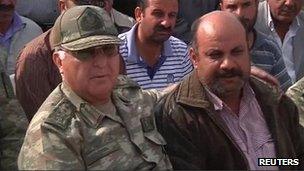Turkey warns Syria of stronger response over shelling
- Published

Turkey's top military commander has warned Syria that it will respond with greater force if it continues its cross-border shelling.
Five Turkish civilians were killed by Syrian mortar fire last week, prompting Turkey to fire into Syria for the first time since the uprising began.
Meanwhile, the US has confirmed reports it has a military task force in Jordan.
It is monitoring the security of Syria's chemical and biological weapons as well as helping with the aid effort.
In Turkey, a Syrian passenger plane has been forced to land at Ankara airport. The plane was said to have been travelling from Moscow and Turkish media reports suggested it was suspected of carrying weapons. There is no official statement yet.
Ceasefire rejected
The Turkish armed forces chief of staff Gen Necdet Ozel has been visiting the town of Akcakale, and meeting families of the two women and three children killed there by Syrian shells last week.
He told reporters: "We have retaliated [for Syrian shelling] and if it continues, we'll respond more strongly."
Turkey's Prime Minister Recep Tayyip Erdogan has said there is no intention of starting a war with Syria but that Turkey will defend its territory.
UN Secretary-General Ban Ki-moon had described the cross-border shelling as "extremely dangerous" and has called on Damascus to declare a unilateral ceasefire.
But Syrian foreign ministry spokesman Jihad Maqdisi said rebels would have to stop fighting first, and that Damascus had instead asked Mr Ban to send delegates to countries including Saudi Arabia, Qatar and Turkey who he said "finance, shelter, train and arm these armed groups" asking them to show "their commitment to stopping these acts".
Within Syria, there are reports of fighting along a main route into the biggest city, Aleppo.
UK-based activist group the Syrian Observatory for Human Rights says rebels have taken control of Maaret al-Numan in Idlib province, a town on the main highway that links Damascus with Aleppo.
The Observatory is one of the most prominent organisations documenting and reporting incidents and casualties in the Syrian conflict. The group says its reports are impartial, though its information cannot be independently verified.
Losing Maaret al-Numan would make it difficult for the Syrian army to send reinforcements to Aleppo itself, the organisation says, adding that Syrian army helicopters were circling the area.
In other developments, the pro-government TV station al-Ikhbariya said one of its cameramen, Mohammed al-Ashram, had been killed in the eastern city of Deir Ezzor.
In June, seven journalists and security guards working for the station were killed when gunmen attacked its headquarters south of Damascus.
Chemical weapon planning
On Wednesday, US Defence Secretary Leon Panetta told the BBC that an American military team was in Jordan helping it deal with the influx of Syrian refugees.
Mr Panetta confirmed a report in the New York Times which said more than 150 American specialists were helping Jordan to provide humanitarian aid and with preparations for the possibility of the Syrian conflict spreading to the wider region.
Mr Panetta said the US had been working with Jordan for some time.
He said the advisers were also helping to ensure the security of chemical and biological warfare sites in Syria.
US President Barack Obama has said the deployment or use of such weapons would widen the conflict in the region and would represent a "red line" that would change his thinking.
There are also concerns that the Syrian government could lose control of the weapons.
US Acting Assistant Secretary of Defence George Little told the BBC the shelling into Turkey showed there were "various scenarios in which the Assad regime's reprehensible actions could affect our partners in the region".
"For this reason and many others, we are always working on our contingency planning, for which we consult with our friends," he said.
As Syria's neighbours struggled with the numbers of people fleeing the country, there is mounting pressure on Syria to do more for those displaced.
AFP reported that the first formal refugee camp opened within Syria itself on Wednesday. The site, near the Turkish border, has been set up with the help of foreign donors, including Libya, the agency reports.
In the UK, two people have been arrested at London's Heathrow Airport on suspicion of travelling to Syria for alleged terrorist activities. They are said to have flown into the UK from Egypt.
British police said one line of enquiry was whether the pair were involved in the abduction of two journalists - a British and a Dutch man - in Syria earlier this year.
Dozens of people are thought to have travelled from Britain to Syria to fight in the uprising against President Bashar al-Assad, which began 19 months ago.